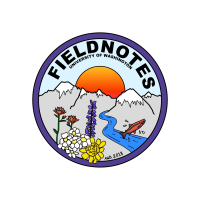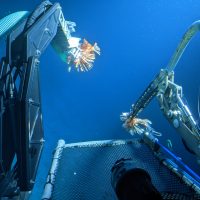Building a sense of community by writing for Fieldnotes
In our second feature on FieldNotes, the student-run undergraduate journal based in the UW College of the Environment, we caught up with Claudia Stile. Claudia is a Marine Biology undergraduate who worked with FieldNotes during her first year at UW. 
How were you involved with FieldNotes?
My involvement in FieldNotes initially began while I was looking into different student involvements within the UW community. While exploring the opportunities in front of me during my first year, it felt very important to me to ensure that I became involved in the community. Additionally, as a Marine Biology major, and someone who loves to learn new things about the world that surrounds them, I found FieldNotes and immediately loved the pieces previous FieldNotes teams have come out with. After reading the blogs and previous journals, I figured why not take the class and participate too!
What makes FieldNotes a valuable part of the UW community?
I think that FieldNotes is an incredibly valuable aspect of the UW community, as it allows students to research various topics of their choice, build teamwork skills through peer reviews and editing, as well as provide other students the ability to publish their research. I feel very lucky to have been able to work with FieldNotes, as I was provided an open canvas to research and work with likeminded people who also want to learn more about topics they wouldn’t usually have the opportunity to research. With this idea, I never would have ordinarily researched the depths of environmental concern within war, however, FieldNotes provided me the opportunity to do so. Additionally, as more and more people read the work that FieldNotes produces, that provides the journal with a larger voice to discuss climate related issues, ecological and humanitarian interactions, as well as how the world functions. The more people read about the world they live and participate in, hopefully the more they will care as well.
Is there a favorite piece you worked on?

One of my favorite articles I had the pleasure of working on is “Tracking Invasive Lionfish Migrations Using Otolith Microchemistry”, featured in the Spring 2024 issue, page 17. This article not only focused on a very interesting subject, but it also allowed me to diver deeper into an issue that pertains to my interest and passion for Marine Biology. This article gave me an introduction into what Marine Biology fieldwork looks like, as well as how the research can be condensed into written form. Scientific writing is a difficult skill, yet FieldNotes has eased me into how to write scientifically, especially in a digestible way. I also think that FieldNotes has encouraged my writing to become better, as editing and focusing on key points were emphasized throughout the creation of this quarter’s journal.
How can other students participate in FieldNotes?
On the topic of making FieldNotes more participatory, I think that we can do this by involving more student artwork and photography, which can be done through further advertisement. I think that this would make the journal even more engaging, as more people would be adding their touch to the UW community. Also, our class this quarter was fairly small, with only 13 people, so it would be great to have more editors on our team in the future.
Working with FieldNotes has made me very excited to continue my education at UW, as well as become further involved with UW research efforts. I hope that I can continue to be involved in FieldNotes, as I think the Journal deserves to have a larger place within the UW community as we cover so many vital topics that certainly need to be heard by more individuals.